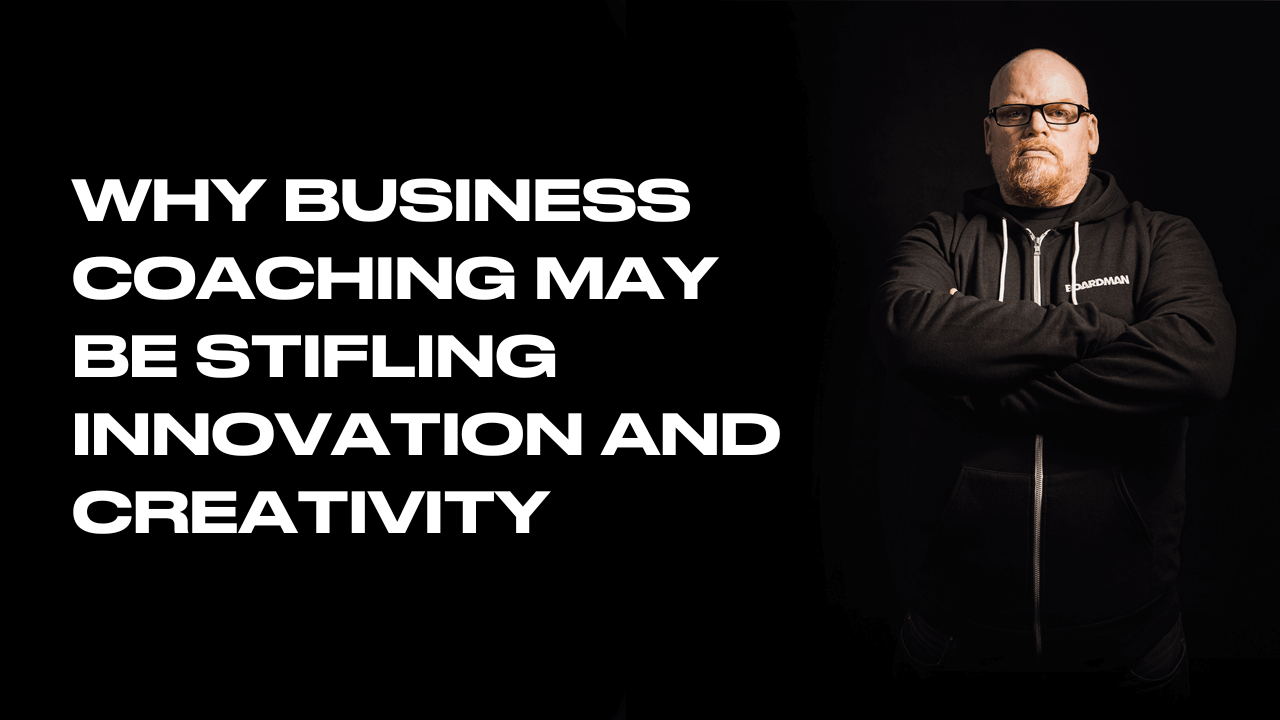
Why Business Coaching May Be Stifling Innovation And Creativity
In the fast-paced world of business, founders and entrepreneurs working in fast-growing companies are often advised to seek the guidance of business coaches.
These coaches offer expertise, strategies, and insights to help navigate the challenges of scaling a company. However, while business coaching can be beneficial in many aspects, there is a growing concern that it may inadvertently stifle innovation and creativity.
In this article, we will explore the potential drawbacks of business coaching in hindering innovation, and provide insights and solutions for business founders and entrepreneurs to strike a balance between coaching and fostering a culture of innovation and creativity.
Business coaching often focuses on proven strategies and best practices that have worked for other companies.
While this can provide valuable guidance, it can also lead to a conformity paradox where companies end up following the same path, limiting their ability to think outside the box and innovate.
According to a study by the Harvard Business Review, organizations that prioritize conformity over creativity are less likely to achieve breakthrough innovation. (Source: "The Innovation Catalysts," Harvard Business Review)
Business coaching frequently emphasizes efficiency and productivity, aiming to streamline processes and maximize profits.
While these objectives are essential, an excessive focus on efficiency can inadvertently hinder the exploration of new ideas and experimentation.
Research conducted by the Massachusetts Institute of Technology (MIT) found that organizations with a strong emphasis on efficiency tend to have lower innovation rates compared to those that prioritize exploration and experimentation. (Source: "The Ambidextrous Organization," Massachusetts Institute of Technology)
Business coaching often encourages a risk-averse mindset by prioritizing stability and minimizing potential pitfalls.
While risk mitigation is crucial, an overly cautious approach can stifle the entrepreneurial spirit and discourage innovative thinking.
According to a report by McKinsey & Company, risk-averse cultures are less likely to foster disruptive innovation compared to organizations that embrace calculated risk-taking. (Source: "Risking It All for Innovation," McKinsey & Company)
In the tech sector, where innovation is paramount, a heavy reliance on business coaching can hinder the development of groundbreaking ideas.
One example is the case of Kodak, a company that failed to embrace digital photography despite having the technology early on. The company's focus on its existing business model and a lack of disruptive thinking, partly influenced by business coaching, led to its downfall. (Source: "Kodak's Downfall Wasn't About Technology," Forbes)
The Software-as-a-Service (SaaS) industry thrives on innovation and adaptability. However, excessive reliance on business coaching can limit the ability of SaaS companies to disrupt markets and develop revolutionary solutions.
Slack, a popular collaboration tool, emerged from a company's internal need for better communication rather than traditional business coaching practices. Its success stemmed from a culture that encouraged employees to experiment and explore new ideas. (Source: "The secret origins of Slack's game-changing software," CNET)
To strike a balance between business coaching and fostering innovation and creativity, business founders and entrepreneurs should consider the following strategies:
Embrace a Culture of Innovation
Encourage a culture that values and rewards creativity, experimentation, and calculated risk-taking.
Provide employees with the freedom to explore new ideas and challenge the status quo.
Foster Diverse Perspectives
Actively seek diversity in your teams to bring in a range of viewpoints and experiences.
Research has consistently shown that diverse teams are more innovative and better equipped to tackle complex challenges. (Source: "How Diversity Makes Us Smarter," Scientific American)
Encourage Cross-Pollination of Ideas
Facilitate opportunities for cross-functional collaboration and knowledge sharing.
Encouraging employees from different departments or teams to collaborate and exchange ideas can lead to innovative solutions that may not have emerged within siloed environments.
This can be achieved through regular team-building activities, cross-departmental projects, or even dedicated innovation labs.
Provide Time and Resources for Exploration
Dedicate specific time and resources for employees to explore new ideas and engage in creative pursuits.
Google's famous "20% time" policy, which allows employees to spend a portion of their workweek on personal projects, has resulted in numerous innovative products and features.
Providing similar opportunities for exploration can foster a culture of innovation within your organization.
Balance Coaching with Outside Perspectives
While business coaching can provide valuable insights and expertise, it is essential to balance it with outside perspectives.
Encourage founders and entrepreneurs to seek input from mentors, industry experts, and networks outside their immediate coaching circle.
This broader range of perspectives can challenge assumptions, introduce new ideas, and inspire fresh approaches.
Continuously Learn and Adapt
Embrace a growth mindset and encourage continuous learning and adaptation within the organization.
Foster a culture that values feedback, encourages experimentation, and learns from both successes and failures.
This approach allows for agility and the ability to pivot quickly in response to changing market dynamics and emerging opportunities.
Conclusion
Business coaching plays a vital role in guiding and supporting business founders and entrepreneurs.
However, it is crucial to recognize the potential unintended consequences that may arise, such as stifling innovation and creativity.
By striking a balance between coaching and fostering a culture of innovation, founders and entrepreneurs can harness the full potential of their teams and organizations.
To thrive in today's rapidly evolving business landscape, it is essential to challenge the status quo, encourage risk-taking, and embrace a culture that nurtures innovation and creativity.
By incorporating the strategies outlined in this article, business founders and entrepreneurs can navigate the fine line between effective coaching and unleashing the untapped potential of their organizations.
By taking a holistic approach that combines the guidance of business coaches with a commitment to fostering innovation, founders and entrepreneurs can create an environment where their teams thrive, disrupt markets, and drive sustainable growth in their mid-stage scaling or fast-growing companies.
If you are an ambitious professional looking to achieve your business goals and take your business to the next level, click here if you'd like to Book a 30-Minute Coaching Session with Ross.


